Cecilia felt herself begin to fall, but was too exhausted to stop her descent. She felt her head hit the corner of the display table next to the door, on the left side just above the temple. Blackness engulfed her and she felt no more.
The next thing she knew, she was walking into Dr. Kardashev’s office. Nikolai was sitting behind the desk, turned a bit to the man facing him, a man in a wheelchair. Cecilia came around the man in the wheelchair, and sat in the hard wooden chair next to Nikolai. She recognized the man Nikolai was speaking to, a man just about anyone in the world would recognize. It was Dr. Stephen Hawking, the renowned cosmologist, physicist and self-described “something of a dreamer”.
Cecilia was astonished to see him, quietly speaking with Nikolai using his computer software-aided voice. At first, neither man acknowledged her presence, and she sat quietly, waiting for Dr. Hawking to finish his sentence. When he’d completed the thought, both men turned and looked at her. Nikolai said, “Cecilia, this is Dr. Stephen Hawking. Dr. Hawking, this is Dr. Cecilia Vasquez, a friend and colleague of mine. Dr. Hawking intoned “How do you do, it is very nice to meet you.” Cecilia replied that it was indeed an honor to meet him. At that moment, Vladimir the graduate student brought tea. Dr. K poured himself and her a cup, and then placed some of the hot liquid in a special cup that connects to a 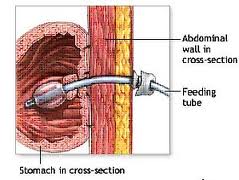 feeding tube inserted into his stomach. Dr. Hawking waited for the tea to cool before opening the other end of the tube.
feeding tube inserted into his stomach. Dr. Hawking waited for the tea to cool before opening the other end of the tube.
Cecilia apologized for interrupting their conversation. Nikolai said, “Oh, no – don’t apologize. We were actually discussing the manuscript and the missing data. Dr. Hawking has a theory about what happened in those two locations on that day.” Cecilia responded with, “But Nikolai, I’ve just come from Olga Arkhipov’s room, and she helped me understand what happened to the data on that day.” Nikolai and Stephen both looked at her expectantly. Somewhat intimidated by the brain power in the room, Cecilia said, “But please, Dr. Hawking, I would be very interested to hear your theory about what happened to the data.”
It took a few minutes of effort on Stephen’s part to enter the information, which then went to the 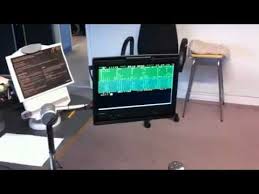 voice-activated system to answer her question. The voice related, “It is possible that the two locations with missing data are related somehow. Miami and Havana are close to one another. It is possible that a
voice-activated system to answer her question. The voice related, “It is possible that the two locations with missing data are related somehow. Miami and Havana are close to one another. It is possible that a 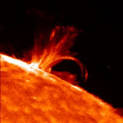 solar flare, coming from an active region around a sunspot, interfered with information transmission on that day, including telephones, fax machines and other, electronic equipment.” Nikolai looked at Cecilia, and asked “Was that what you thought happened to the data back in October of 1962?” Cecilia hesitated to speak, but felt so sure of her information, she continued on. “No, Nikolai – Dr. Hawking…may I call you Stephen?” The answer droned back in 5 seconds: “No.” But then he smiled, and she knew he was just being his usual, mischievious self. “Nikolai, Stephen, I know what happened to the data that day. I am convinced that there was a nuclear exchange between the
solar flare, coming from an active region around a sunspot, interfered with information transmission on that day, including telephones, fax machines and other, electronic equipment.” Nikolai looked at Cecilia, and asked “Was that what you thought happened to the data back in October of 1962?” Cecilia hesitated to speak, but felt so sure of her information, she continued on. “No, Nikolai – Dr. Hawking…may I call you Stephen?” The answer droned back in 5 seconds: “No.” But then he smiled, and she knew he was just being his usual, mischievious self. “Nikolai, Stephen, I know what happened to the data that day. I am convinced that there was a nuclear exchange between the  Russian B-59 submarine and the American ships monitoring its location and activities. Based on the information I was able to gather from Vasili Arkhipov’s widow, Havana and Miami were both involved in the
Russian B-59 submarine and the American ships monitoring its location and activities. Based on the information I was able to gather from Vasili Arkhipov’s widow, Havana and Miami were both involved in the  nuclear exchange.”
nuclear exchange.”
As soon as the words were out of her mouth, Cecilia’s face reddened and she realized how foolish that must sound to the two eminent scientists. Neither man spoke for what felt like an eternity. Finally, Nikolai coughed to clear his throat, and said “That is a very interesting theory, I must say…Dr. Vasquez.” He remained silent and waited for Stephen to either laugh through that strange, droning computer voice, or tell Cecilia that she’d lost her mind. But both Nikolai and Cecilia were surprised to hear him say, “I had not considered that hypothesis. Would you mind explaining how you arrived at that conclusion?”
Cecilia laid out her explanation in her usual, careful and detailed way. Both men listened intently as she explained what she had heard and seen from her various sources, including her grandfather. She finished her explanation by showing them the 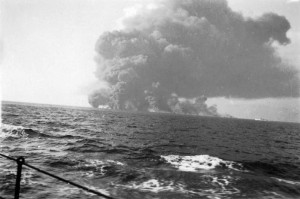 picture that Olga had handed her before she fell. Before she fell. Cecilia thought to herself, “The last thing I remember was falling and hitting my head in some room away from here. I wonder how I got back to Nikolai’s office? Perhaps I had a touch of amnesia after the accident. I’ll have to think about that later.” She also noticed something she hadn’t paid attention to before. At the top of the picture the date October 27, 1962 was embedded into the photographic paper. But how was that possible? The information on the photograph would have been written in Russian. She began to feel dizzy, nauseated and foolish.
picture that Olga had handed her before she fell. Before she fell. Cecilia thought to herself, “The last thing I remember was falling and hitting my head in some room away from here. I wonder how I got back to Nikolai’s office? Perhaps I had a touch of amnesia after the accident. I’ll have to think about that later.” She also noticed something she hadn’t paid attention to before. At the top of the picture the date October 27, 1962 was embedded into the photographic paper. But how was that possible? The information on the photograph would have been written in Russian. She began to feel dizzy, nauseated and foolish.
She started to apologize to the men for wasting their time with this foolish notion she’d just shared. Nikolai looked at Stephen, who spoke directly to Cecilia. “Perhaps you are, in fact, onto something with your self-described ‘foolish notion’. I believe that you may have inadvertently stumbled onto a situation that demonstrates my theory of Model-Dependent Realism, which I detailed in my book  The Grand Design.” Stephen blinked at an icon on his computer screen, and a picture of the book appeared. “Let me explain. I hypothesize that reality is what we perceive it to be, and there is no one, discrete reality. Just as I suggested in my book, The Grand Design, a fish in a bowl has a perception of its surroundings, very different from the young girl walking and holding the fishbowl. Einstein concurred with my hypothesis, when he formulated his theory of relativity. He described a man on the train’s perception of velocity, time and space, compared with the man’s view from the platform. They would be very different. So perhaps the picture is real, and a nuclear exchange did occur on that day in 1962. It is also possible that someone is making a terrible joke at your expense. It would require more testing to determine if either hypothesis is correct. But if you’d like to know more, you can purchase my book, The Grand Design from Amazon.com for the low, low price of thirteen dollars and twenty eight cents. You won’t regret your purchase.” With that, Stephen sat, smiling placidly in his chair.
The Grand Design.” Stephen blinked at an icon on his computer screen, and a picture of the book appeared. “Let me explain. I hypothesize that reality is what we perceive it to be, and there is no one, discrete reality. Just as I suggested in my book, The Grand Design, a fish in a bowl has a perception of its surroundings, very different from the young girl walking and holding the fishbowl. Einstein concurred with my hypothesis, when he formulated his theory of relativity. He described a man on the train’s perception of velocity, time and space, compared with the man’s view from the platform. They would be very different. So perhaps the picture is real, and a nuclear exchange did occur on that day in 1962. It is also possible that someone is making a terrible joke at your expense. It would require more testing to determine if either hypothesis is correct. But if you’d like to know more, you can purchase my book, The Grand Design from Amazon.com for the low, low price of thirteen dollars and twenty eight cents. You won’t regret your purchase.” With that, Stephen sat, smiling placidly in his chair.
Then Cecilia felt the room begin to fade, as though she were in a movie and the last frame had been shown. Both men continued to stare at her, but she felt herself moving backward, away from them. The room grew totally black. She attempted to speak, but no words came forth. Cecilia began to wonder if this was all a dream, from which she was about to awaken. In the next moment, she felt her eyelids begin to flutter. A wave of incredible nausea hit her, and she was afraid she was going to throw up in front of the two most eminent cosmologists in the world. But she couldn’t hold it back. She leaned over to her right, and began to vomit. She felt something hard and plastic forced under her lower lip. Waves of nausea continued to engulf her, and she purged what little remnants of breakfast remained. She turned back. Now she was lying on her back in a bed. A 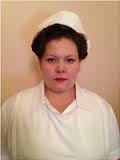 nurse – the same nurse that had interrogated her about visiting Olga – continued to hold the
nurse – the same nurse that had interrogated her about visiting Olga – continued to hold the  plastic container into which she had just been sick. “Where am I?” Cecilia asked. The nurse replied, “You’ve had a serious bump to your head, and have been unconscious for several hours. The doctor has been in and examined you. He has indicated you will need a full set of x-rays of your skull in order to determine the damage. But he wanted us to wait until you regained consciousness before we took you over to x-ray. So now you are conscious. We will take you to x-ray.
plastic container into which she had just been sick. “Where am I?” Cecilia asked. The nurse replied, “You’ve had a serious bump to your head, and have been unconscious for several hours. The doctor has been in and examined you. He has indicated you will need a full set of x-rays of your skull in order to determine the damage. But he wanted us to wait until you regained consciousness before we took you over to x-ray. So now you are conscious. We will take you to x-ray.
Cecilia again felt the need to regurgitate her stomach contents. She rolled her head painfully to the right, but there was nothing left save stomach bile. She turned back and asked for a tissue to wipe her mouth and chin. The nurse handed her a tissue, and waited for her response. “I think I need to wait a bit until the room stops spinning, if you don’t mind.” The nurse retorted, “If you have a fractured skull, it’s better we find out now than later. You will please cooperate and we will get this done as quickly as possible.
The nurse pressed a button over the bed, and a minute later, 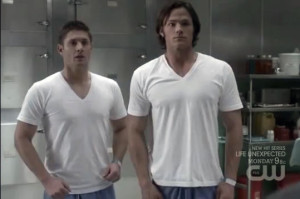 two burly orderlies came into the room. She spoke to them in Russian, and they nodded, as one of them released the stop against the bed’s left wheel. They pushed her out into the hall, and down the corridor. After an excruciating 45 minutes of being twisted and turned in seemingly every direction, the x-rays were complete and they returned Cecilia to her room. She was exhausted, ill and was having a hard time remembering much of anything that had occurred in the recent past. But she was sure about two things. First: nuclear war had, in fact, devastated Miami and Havana on October 27, 1962. And second: Stephen Hawking was a shameless pitch man for his
two burly orderlies came into the room. She spoke to them in Russian, and they nodded, as one of them released the stop against the bed’s left wheel. They pushed her out into the hall, and down the corridor. After an excruciating 45 minutes of being twisted and turned in seemingly every direction, the x-rays were complete and they returned Cecilia to her room. She was exhausted, ill and was having a hard time remembering much of anything that had occurred in the recent past. But she was sure about two things. First: nuclear war had, in fact, devastated Miami and Havana on October 27, 1962. And second: Stephen Hawking was a shameless pitch man for his 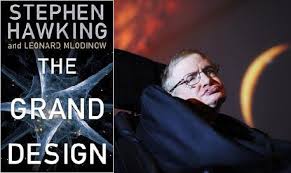 book. But how she got that notion was a complete mystery to Cecilia. She was just sure it was so.
book. But how she got that notion was a complete mystery to Cecilia. She was just sure it was so.

 Do we really have a reason to believe that objective reality exists?
Do we really have a reason to believe that objective reality exists?